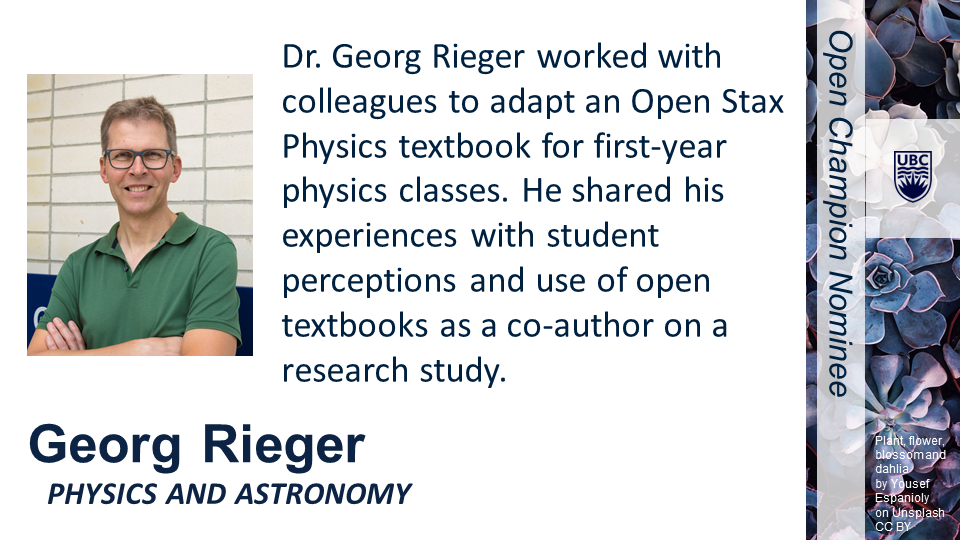This week, we hear from Georg Rieger, Instructor in the Department of Physics and Astronomy and Dept. Director of the Carl Wieman Science Education Initiative.
~~~
What motivated you do adopt/adapt/create open educational resources in your work?Before switching to open educational resources, Physics 100 used a lot of external resources: a commercial online homework platform, a commercial textbook, the Piazza discussion forum, the LMS (‘connect’ at the time) that contained the lab materials. While all of these are good resources, the course had a disjointed feel. The adoption of the open textbook allowed us to integrate all course resources into a website on the edX.edge platform and customize it into a weekly structure. Each weekly module on edX.edge now contains the relevant reading integrated with concept questions, videos, the weekly homework and extra practice, as well as the bi-weekly tests. We also wanted to eliminate all cost and the all administrative overhead relating to registration issues. Having all course resources available on the first day of classes for all students is a big plus.
Can you tell us about the open education projects you have been working on?This was the largest open-education project for me so far. I have also developed worksheet activities for Physics 100, Physics 101, Physics 117 (Vantage College) and Physics 118 (both Vantage College and Physics & Astronomy), which I share widely with my colleagues. I have just obtained funding for a new project that will also see the adoption of an open text and its customized integration into the edx.edge platform. The new project will eliminate all costs in Physics 117 for Vantage One students, but is aimed at a wider audience. In collaboration with my Academic English colleagues from Vantage College, we will enhance the open physics text with Academic English resources. Our goal is to create an enhanced physics textbook that will be useful for all students whose first language is not English. At UBC, the new resources will primarily be used in Physics 117 (in Vantage) and also in VANT 140. The latter is a course Vantage College students take to support their use and understanding of Academic English. Naturally, the open resources will be available to anyone who may find it useful. We hope to implement a first version in the fall term of 2020 and have a version that can be widely shared in summer 2021.
What benefits have you seen from using open educational resources in the classroom?Our surveys have shown that students highly appreciate the customization of the textbook into weekly readings. The editing provides important guidance to them and limits the material to what is actually used in the course. Several survey responses have emphasized how frustrating it is to purchase a big commercial textbook and then see that only half of the material is used in the course. Obviously all of our students like that there is no cost. But for some students this is more meaningful: In survey responses, a fairly large fraction of students told us that they often do not purchase a required text due to lack of funds. Adopting OER materials can thus increase equity and inclusivity in our courses. For interested readers, our survey results are published in an open online journal.
What was the biggest challenge you faced and how did you overcome it?Creating the homework and test question databases. The open textbook has a lot of end-of-chapter problems, which is good, but it was still a lot of work to code those questions into edX.edge. Fortunately we had TLEF funding and could hire very capable graduate students to help us do this work.
Do you have any advice for other faculty developing OER?OER is not only about elimination of cost. The potential for customization can sometimes support our courses better than commercial resources. Make use of the new funding opportunities that are available to keep the additional work at a reasonable level.
Is there anything else you’d like to add about OER at UBC?UBC is striving to be an inclusive environment for all students. However, not all of our students can afford to live on campus or even in Vancouver. I believe that OER resources can play an important role in this context. The recognition by the AMS and the creation of targeted funding for the development and implementation of OER are important first steps.
~~~
Thank you, Georg, for taking the time to participate!

